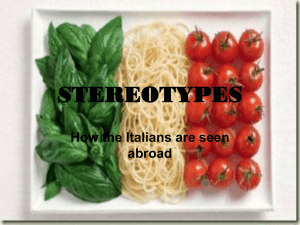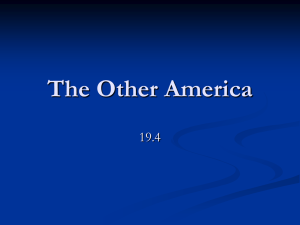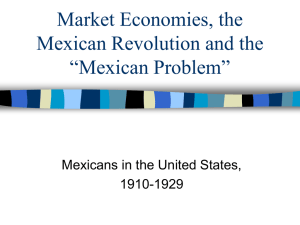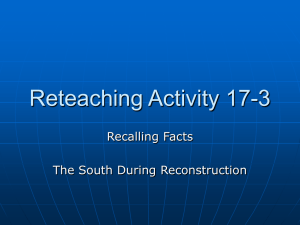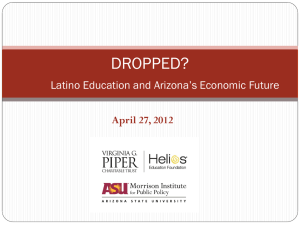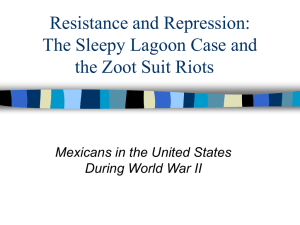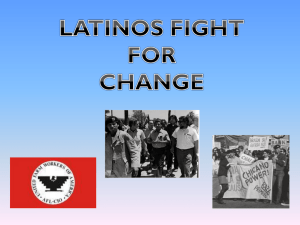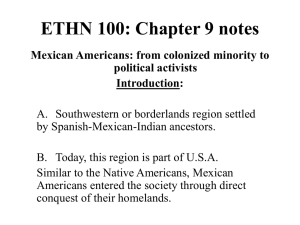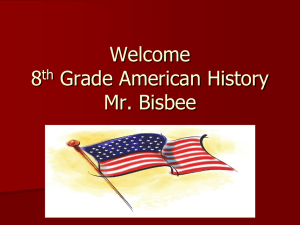Latinos United: Mexican, Italian, and Spanish Miners:
advertisement
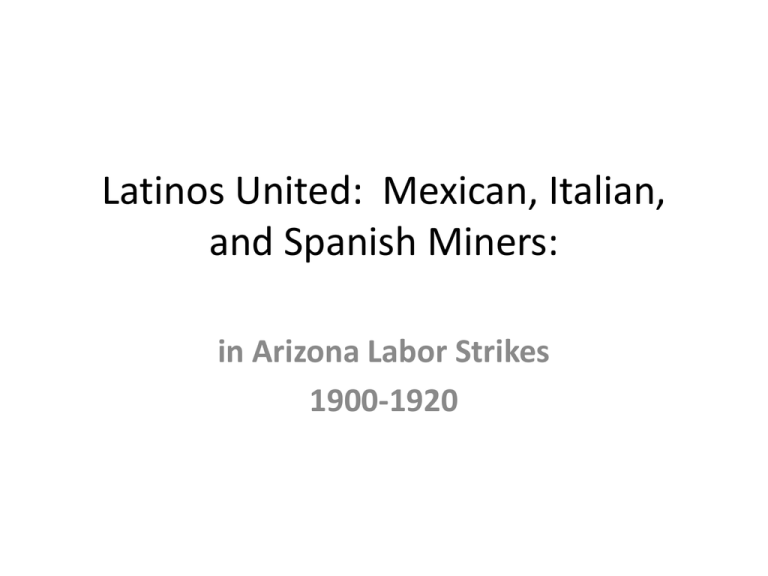
Latinos United: Mexican, Italian, and Spanish Miners: in Arizona Labor Strikes 1900-1920 Learning about a Miner’s life from the bottom-up Butte, Montana Copper City Rivals with Bisbee for title “Queen of Copper Camps” Copper Prices Soar, Industrial Uses Arizona Copper Towns Grew Whiteness was Important • • • • • • • White = Northern Europeans Often skilled Workers: Cornish and Irish Whites Got better Wages Whites Got better housing Whites likely to have political control Whites control “craft” or skilled Unions Whites Got perks like being in the local band La Raza Latina/La Razza Latino • Some groups were “IN BETWEEN” whites and minorities. Certain privileges BUT • Also faced prejudice and discrimination • The “Latin Race” was at times a source of PAN ETHNIC IDENTITY for * Mexicans * Spaniards * Italians European Spanish Speakers seen as “Dark” Light 26% Dark 74% Dark Light Race is “Italian” for U.S. born 8 World War I -> Labor issues Radical Groups fight for control of Unions War $$ = + Huge Profits for Copper Companies BUT ----No raises for workers AND ----Price of daily goods increases THUS-- Arizona beset with big strikes ALSO small “strikitos” • Labor Forward = battle cry • Western Federation of Miners grows * Mexicans, Italians, and Slavs from Globe, AZ *Spaniards from Ray, AZ *Latins of Clifton/Morenci, AZ • 1917 alliance of Mexican and Spanish, Italians, and Slavic groups control: Arizona State Federation of Labor’s • ONLY ONE GROUP WINS… WHY??? LATIN UNITY Bisbee Whitest White Town • De Jure segregation of Chinese “Sundown Law” • De Facto segregation of Mexicans, Blacks, and southern European Immigrants • Mexicans could not work underground • Italian miners earned less than other Europeans • NO UNIONS Wages by Groups 1911 Wages under $3 1911 Dillingham Comission Anglo All Foreign Italian Mexican 0% 50% 100% Tintown: Bisbee Barrio Brewery Gulch, Bisbee Lower Gulch Poor Whites Southern Europeans Racial Minorities AND Upper Gulch Very Poor Prostitution Gambling Drugs Above and Beside Two More Barrios Labor Struggle WFM vs Industrial Workers of the World 14 Bisbee Deportation 1917 Mexicans Sided with Industrial Workers of World in hopes of better work Italians Sided with Western Federation of Miners Globe, Arizona • Another White Man’s Camp • Chinese could live in town but segregated • New Immigrants lived in one area League of Nations Mexicans and Italians could join the powerful local union Western Federation of Miners In Globe, Arizona Italians formed a Little Italy They were self-sufficient and strongly pro Union. From the same area in Italy their unity: Piemontese Not as willing to join Mexicans in strike efforts Italians Had their own Saloons Bocce was a popular sport among Italians Globe Boarding House Women contributed to the economy by being frugal at home PLUS Took in Borders Worked in Laundries or Family Business Clifton/Morenci/Metcalf Mexican Camp Railroads linked remote sites Many Groups were Catholic Clifton was considered a City Minorities, including Chinese merchants, lived along Chase Creek All areas had Latin influences The band is not an official company band, but one popular for celebrations like dances, weddings, funerals, etc. Shannon Hill housed a Mexican barrio (below) and a Spanish enclave (Above) Spaniards arrived in Arizona later than Italians but both groups identified with Mexican as workers. Morenci was a Mexican Town Clifton, Morenci, and Metcalf had high percentages of Mexicans, Italians and Spaniards (who arrived later and avoided “White Towns”) Wedding: Granieri Family of Morenci Immigrants tended to marry within their region Lived near each other in Morenci’s Seven Hills BUT apart from Whites Calabrese Family Pictured here All Groups also Intermarried Anarchists mixed ideas in Mexico and Europe Latin Unity Won Labor Conflicts • Italians invited to join Mexican Mutialistas * 1903 “wild cat” strike 5 Mexicans and 4 Italian leaders sent to prison Pan-Latin Group (Spanish too) Wins Concessions in War Years 1915- 1918 Joining Union OPEN PIT COPPER MINES: CHEAP AND EFFICIENT Ethnic Neighborhoods destroyed since company owned the land in mining towns. Groups still hold reunions recalling life in Morenci and Ray.
